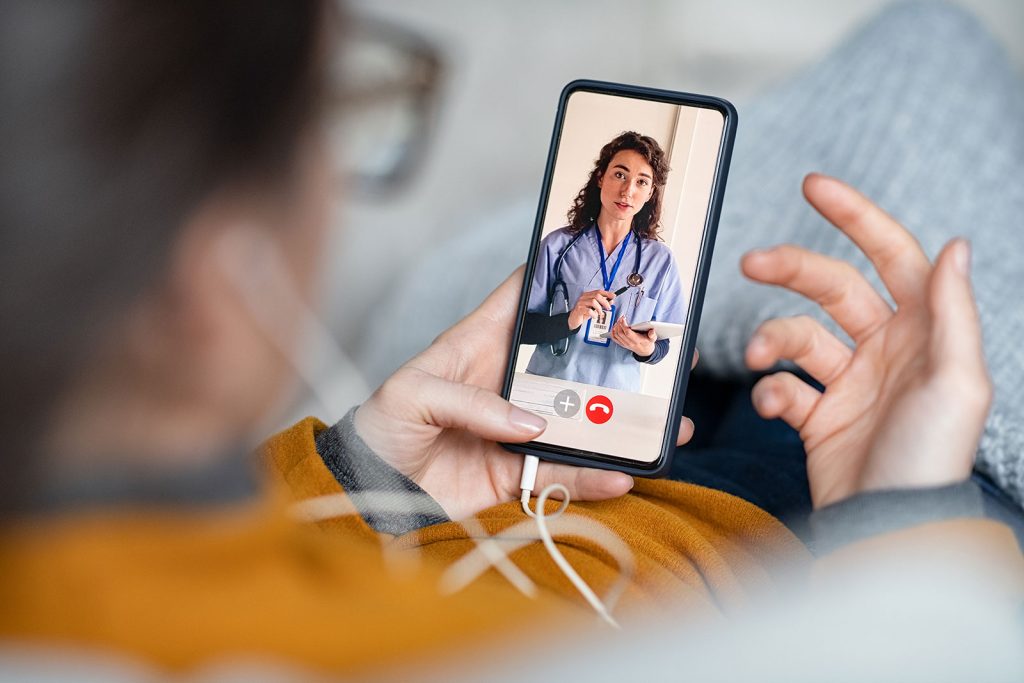Are you struggling with mental health or addiction issues? Has the COVID-19 pandemic made you hesitant to seek in-person treatment? Our telehealth services offer you safe, convenient access to essential mental health care support. Teletherapy is a virtual care option for many patients who would benefit from outpatient addiction treatment.
Table of Contents
Teletherapy for Addiction and Dual Diagnosis Treatment
COVID-19 has affected many individuals’ mental health. The stress of physical illness, social isolation, economic instability, and global uncertainty has increased depression, anxiety, and substance use. Unfortunately, many people who need help and support cannot access it due to the pandemic.
Virtual therapy is a way to connect people who are struggling with psychological or emotional instability with mental health professionals. During telehealth sessions, patients connect virtually with a provider, support group, or counselor. Instead of in-person, they attend appointments via phone calls, video conferencing apps such as Zoom, or text messaging.
At Garden State Treatment Center, we offer teletherapy services to our outpatient clients so that we can provide virtual care even when you can’t visit us in the office.
How can Virtual Therapy support my Detox?
Detoxification is a challenging and risky process that should never be attempted alone.
Detox goes beyond eliminating chemicals from your system. It involves reframing thoughts, expectations, and behaviors to achieve and maintain sobriety. Professional mental health support is crucial for a successful recovery journey.
Psychotherapy, or talk therapy, is a common form of mental health support that can significantly benefit individuals undergoing detoxification. It is an essential tool that you can use during and after detox. It allows for a deeper understanding of thoughts and emotions, helping individuals develop coping strategies and new ways of thinking, making it a crucial component of overall addiction treatment programs.
Teletherapy supports your detox by providing the emotional support, accountability, and guidance you need to progress through this rigorous time.
Even if you have already gone through the initial detox, telehealth provides a continuation of care. You can expand on the tools, knowledge, and skills you have already gained to progress toward a life of fulfillment and sobriety.
How does Telehealth work for Rehab?
We will lead you through an assessment before you begin virtual care with us. This allows our providers to learn more about you and why you seek support. Once the areas of concern are addressed, we will develop a customized treatment plan that includes individual teletherapy sessions as well as other strategies for helping you get through detox and recovery.
Group sessions may be held via online therapy platforms. You will also participate in one-on-one online counseling sessions with a licensed therapist.
As you progress in your journey, you can step down your level of care. This generally means that your group and individual sessions will become less frequent for virtual care. You can work with your care provider to tailor the strategy for your needs and continually assess your progress.

Types of Treatments offered through Teletherapy
You might be surprised at the range of treatments that can be accomplished through teletherapy. In many cases, participating in virtual care is often similar as working with a therapist in person. In other situations, treatments are adapted to the long-distance environment.
Some of the addiction treatment options that mental health providers use during online therapy sessions include:
- Cognitive-behavioral therapy (CBT) – A type of psychotherapy that aims to transform negative and unhealthy thoughts and behavior patterns into positive, constructive ones. Techniques involve awareness, self-exploration, goal-setting, and decision-making exercises.
- Dialectical behavior therapy – This style of psychotherapy teaches you how to accept your current situation and develop mindfulness so that you don’t get caught up in intrusive thoughts and harmful behavioral patterns.
- Talk therapy – Talking to a counselor or therapist about your addiction and mental health issues has been effective for treating substance abuse. This type of therapy is flexible and depends on you, the therapist, and your treatment plan.
- Group therapy – Hearing the perspectives of others in your situation gives you additional resources for developing your own coping skills and feeling supported.
- Family therapy – In many cases, important loved ones can also work with a mental health professional so that they can understand your struggles and stand behind you on your journey.
It’s important to note that not all online mental health counseling platforms are HIPAA-compliant. However, reputable teletherapy platforms prioritize client confidentiality and follow strict guidelines set by the Health Insurance Portability and Accountability Act (HIPAA). This means that all communication and personal information shared during teletherapy sessions are secure and protected.
Furthermore, insurance companies have recognized the value and effectiveness of teletherapy in modern mental health treatment. Many insurance providers now cover virtual therapy sessions, making it more accessible and affordable for individuals seeking help.
However, it’s important to note that some insurance plans may have restrictions or limitations on coverage for online therapy. It’s always best to check with your insurance provider beforehand to see if they cover teletherapy services and their specific guidelines.
Does Teletherapy Work for Addiction?
Teletherapy, also known as virtual therapy or telehealth, has been proven to be an effective form of treatment for individuals struggling with addiction. Some may even find it to be a more satisfactory option than in-person therapy for addressing mental health issues. However, it’s important to note that everyone is different and may respond differently to teletherapy.
One obstacle to teletherapy is the need for a stable internet connection and familiarity with using devices. However, geographical or financial constraints may make this unfeasible for some. Additionally, those who prefer face-to-face communication may struggle with adjusting to teletherapy. In such cases, in-person therapy may be a better option.
It is also crucial to find a therapist who is experienced and qualified in providing teletherapy for addiction treatment. They should be able to effectively use technology to provide the same level of care as they would in an in-person session.
Garden State Treatment Center recognizes this and offers traditional therapy methods for addiction treatment, including teletherapy options, connecting you with licensed therapists and social workers specializing in substance abuse and incorporating tailored treatment plans and support for individuals struggling with addiction. Our team is trained in providing virtual care and strives to provide the same level of care as our in-person sessions.

Benefits of Teletherapy
Aside from addiction treatment, teletherapy has also been widely used to deliver various mental health services. This includes therapy for depression, anxiety, trauma, and other mental health disorders. With the rise of telemedicine, individuals now have easier access to mental health professionals and can receive timely support without leaving their homes.
With the ability to receive support and guidance from a therapist in the comfort of your own home, teletherapy offers several benefits that traditional in-person therapy may not provide, such as:
Convenience
Teletherapy for addiction offers a significant benefit: convenience. It allows individuals to receive real-time treatment without leaving their own homes, accommodating various responsibilities and routines.
Teletherapy also offers a solution for individuals with health conditions and disabilities that may make it challenging to attend in-person therapy sessions. This may include chronic illnesses, mobility issues, and compromised immune systems. Teletherapy eliminates the need for travel or potential exposure to disease in a waiting room, making it a safer and more convenient option for those with health conditions.
Flexible Schedule
In addition, teletherapy sessions can be more flexible in terms of scheduling. This is especially helpful for those with busy schedules or who may have difficulty traveling to in-person therapy sessions. With teletherapy, individuals can schedule sessions at times that work best for them, making it easier to prioritize treatment and recovery.
Privacy
Another benefit of teletherapy for addiction is its increased privacy and anonymity. Individuals may feel more comfortable sharing their struggles and experiences in a virtual setting rather than in an in-person session. This increased sense of privacy can help individuals feel more at ease and be more honest with their clinicians. Additionally, teletherapy eliminates the possibility of running into someone you know at a therapy office, which may be a concern for some individuals seeking treatment.
Specialized Treatment Options
Teletherapy also offers the advantage of access to specialized treatment options, such as those with mental health conditions, including eating disorders. Eating disorders are complex mental illnesses that may face challenges such as body image concerns and social anxiety and require specialized treatment and support. Telemental health sessions can offer a way for individuals to receive this mental health treatment from the comfort of their own homes,
Continued Support
or individuals in recovery. With the ability to schedule sessions at times that work best for them, individuals can continue to access therapy and support even after their initial treatment program has ended. This can help prevent relapse and promote long-term recovery. Additionally, teletherapy allows for easier access to follow-up appointments and check-ins without needing transportation or time off work.
Conclusion
If you are seeking addiction treatment in New Jersey, Garden State Treatment Center offers a range of options, including telehealth services. At Garden State Treatment Center, we take pride in offering professional therapy services that prioritize your comfort and confidence in your care.
Our team is dedicated in providing high-quality care and support for individuals struggling with addiction and co-occurring mental health disorders. We strive to make the process as comfortable and convenient as possible, which is why we offer virtual care options in addition to traditional inpatient and outpatient services.
Don’t hesitate to reach out to us if you or a loved one is in need of addiction treatment – we are here to help on your journey towards recovery. Let Garden State Treatment Center be your partner in achieving long-lasting sobriety and a healthier, happier life.



